stop start CITROEN C-ELYSÉE 2016 Owners Manual
[x] Cancel search | Manufacturer: CITROEN, Model Year: 2016, Model line: C-ELYSÉE, Model: CITROEN C-ELYSÉE 2016Pages: 260, PDF Size: 7.11 MB
Page 4 of 260
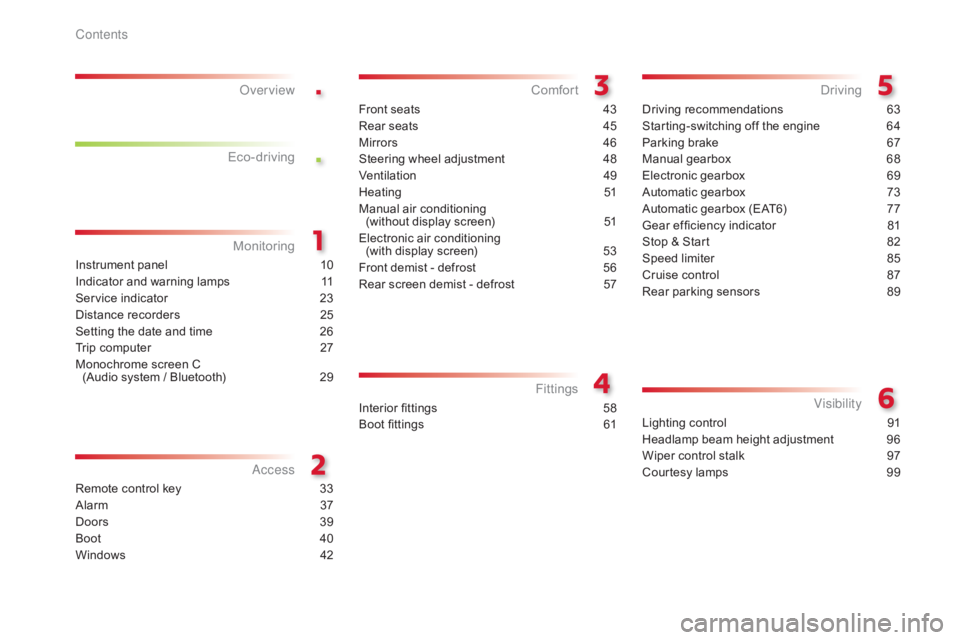
.
.
C-elysee_en_Chap00a_sommaire_ed01-2016
Instrument panel 10
Indicator and warning lamps
1
1
Service
indicator
2
3
Distance
recorders
2
5
Setting
the date and time
2
6
Trip
computer
2
7
Monochrome
screen C
(Audio
system / Bluetooth)
2
9
MonitoringOver view
Remote control key 3
3
Alarm
3
7
Doors
39
Boo
t
4
0
Windows
4
2
Access
Front seats 43
Rear seats
4
5
Mirrors
4
6
Steering
wheel adjustment
4
8
Ventilation
4
9
Heating
5
1
Manual
a
ir
c
onditioning
(
without display screen)
5
1
Electronic
air conditioning
(with
display screen)
5
3
Front
demist - defrost
5
6
Rear
screen demist - defrost
5
7
Comfort
Driving recommendations 63
Starting-switching off the engine
6
4
Parking
brake
6
7
Manual
g
earbox
6
8
Electronic
gearbox
6
9
Automatic
gearbox
7
3
Automatic
gearbox (EAT6)
7
7
Gear
ef ficiency indicator
8
1
Stop
& Start
8
2
Speed
limiter
8
5
Cruise
control
87
R
ear parking sensors
8
9
Driving
Lighting control 91
Headlamp beam height adjustment
9
6
Wiper
control stalk
9
7
Courtesy
lamps
9
9
Visibility
Eco-drivingInterior fittings 5
8
Boot fittings
6
1
Fittings
Contents
Page 16 of 260
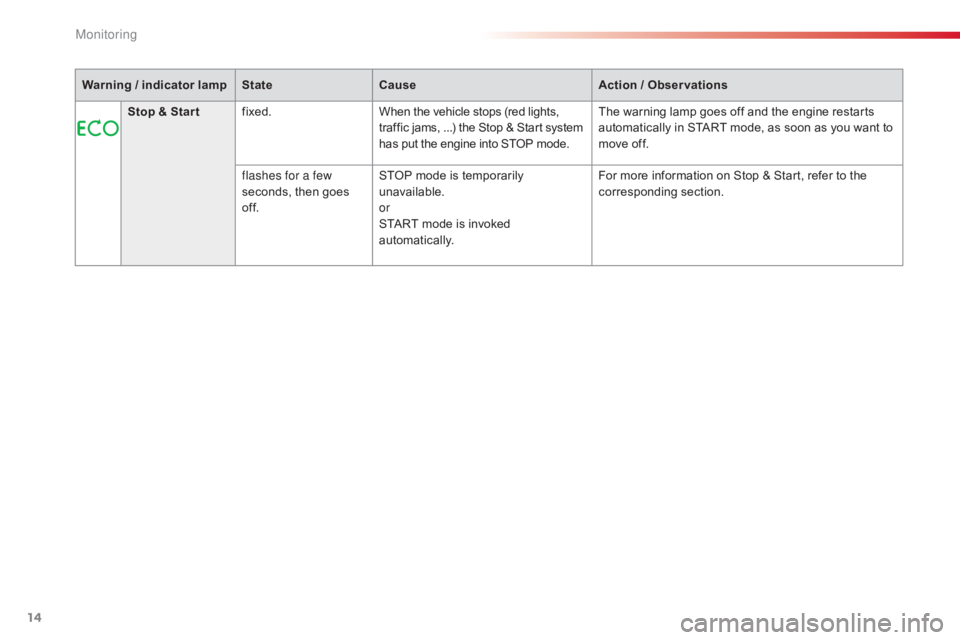
14
Warning / indicator lampStateCause Action / Observations
Stop & Star t fixed. When
the vehicle stops (red lights,
t
raffic jams, ...) the Stop & Start system
h
as put the engine into STOP mode.The
warning lamp goes off and the engine restarts
a
utomatically in START mode, as soon as you want to
m
ove off.
flashes for a few
seconds,
then goes
o
f f.STOP
mode is temporarily
u
navailable.
or
START
mode is invoked
au
tomatically.For
more information on Stop & Start, refer to the
c
orresponding
s
ection.
Monitoring
Page 20 of 260
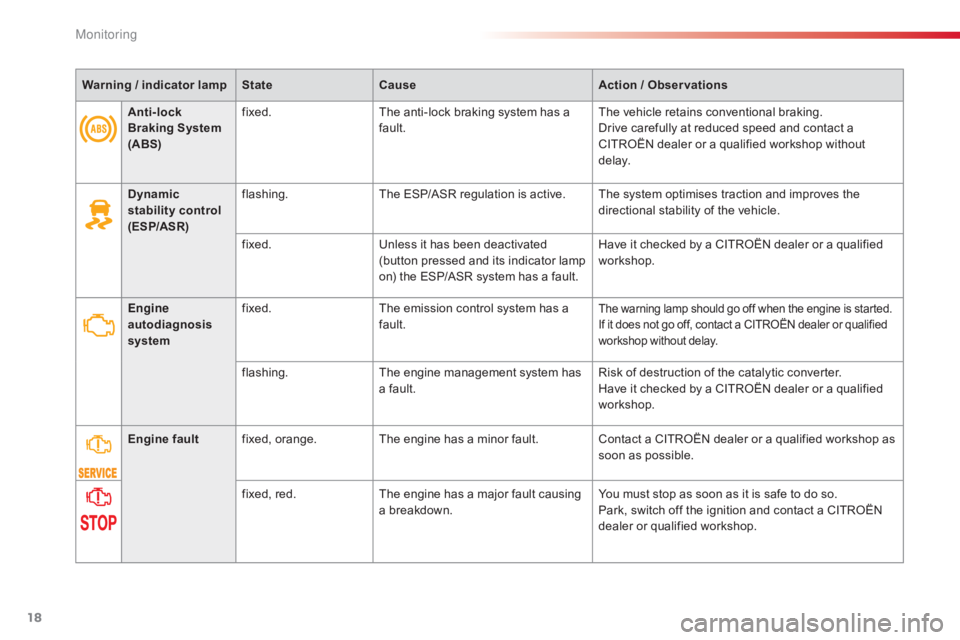
18
Warning / indicator lampStateCause Action / Observations
Dynamic
stability control
(ESP/ASR) flashing.
The
ESP/ASR regulation is active. The system optimises traction and improves the
d
irectional stability of the vehicle.
fixed. Unless
it has been deactivated
(
button pressed and its indicator lamp
o
n) the ESP/ASR system has a fault.Have
it checked by a CITROËN dealer or a qualified
w
orkshop.
Engine
autodiagnosis
system fixed.
The
emission control system has a
f
ault.
The warning lamp should go off when the engine is started.
I f it does not go off, contact a CITROËN dealer or qualified w
orkshop without delay.
flashing. The engine management system has a
fault. Risk
of destruction of the catalytic converter.
Have it checked by a CITROËN dealer or a qualified
w
orkshop.
Anti-lock
Braking System
(ABS)
fixed.
The anti-lock braking system has a
f
ault.
The vehicle retains conventional braking.
Drive carefully at reduced speed and contact a
C
ITROËN dealer or a qualified workshop without
d
e l ay.
Engine fault fixed,
o
range. The
engine has a minor fault. Contact a CITROËN dealer or a qualified workshop as
s
oon as possible.
fixed,
red. The
engine has a major fault causing
a
breakdown. You
must stop as soon as it is safe to do so.
Park,
switch off the ignition and contact a CITROËN
d
ealer or qualified workshop.
Monitoring
Page 38 of 260
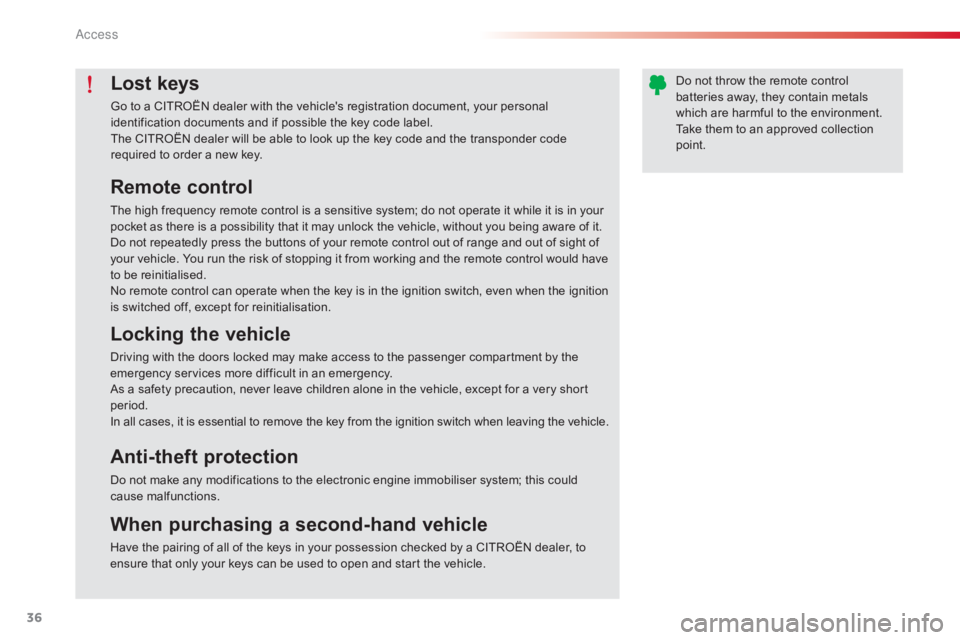
36
C-elysee_en_Chap02_ouvertures_ed01-2016
Lost keys
Go to a CITROËN dealer with the vehicle's registration document, your personal identification documents and if possible the key code label.
The
CITROËN dealer will be able to look up the key code and the transponder code
r
equired to order a new key.
Remote control
The high frequency remote control is a sensitive system; do not operate it while it is in your pocket as there is a possibility that it may unlock the vehicle, without you being aware of it.
Do
not repeatedly press the buttons of your remote control out of range and out of sight of
y
our vehicle. You run the risk of stopping it from working and the remote control would have
t
o be reinitialised.
No
remote control can operate when the key is in the ignition switch, even when the ignition
i
s switched off, except for reinitialisation.
Locking the vehicle
Driving with the doors locked may make access to the passenger compartment by the emergency services more difficult in an emergency.
As
a safety precaution, never leave children alone in the vehicle, except for a very short
p
eriod.
In
all cases, it is essential to remove the key from the ignition switch when leaving the vehicle.
Anti-theft protection
Do not make any modifications to the electronic engine immobiliser system; this could cause m alfunctions.
When purchasing a second-hand vehicle
Have the pairing of all of the keys in your possession checked by a CITROËN dealer, to ensure that only your keys can be used to open and start the vehicle.Do
not throw the remote control
b
atteries away, they contain metals
w
hich are harmful to the environment.
Take them to an approved collection
po
int.
Ac
Page 65 of 260
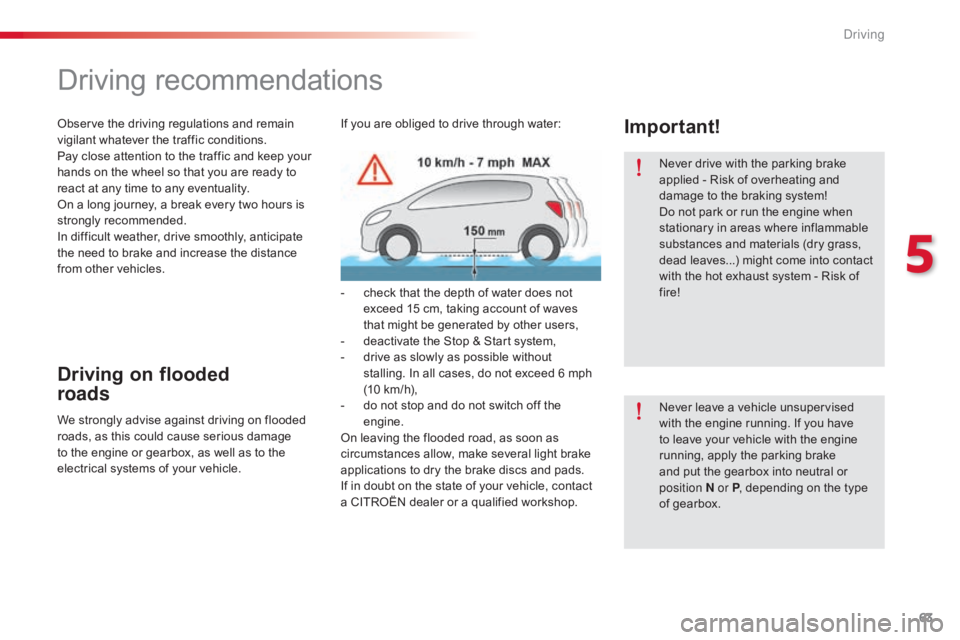
63
C-elysee_en_Chap05_conduite_ed01-2016
Never drive with the parking brake applied - Risk of overheating and
d
amage to the braking system!
Do
not park or run the engine when
s
tationary in areas where inflammable
s
ubstances and materials (dry grass,
d
ead leaves...) might come into contact
w
ith the hot exhaust system - Risk of
f
ire!
Never
leave a vehicle unsupervised
w
ith the engine running. If you have
t
o leave your vehicle with the engine
r
unning, apply the parking brake
a
nd put the gearbox into neutral or
p
osition
N or P,
depending on the type
o
f gearbox.
Driving recommendations
Observe the driving regulations and remain vigilant whatever the traffic conditions.
Pay
close attention to the traffic and keep your
h
ands on the wheel so that you are ready to
r
eact at any time to any eventuality.
On
a long journey, a break every two hours is
s
trongly
re
commended.
In
difficult weather, drive smoothly, anticipate
t
he need to brake and increase the distance
f
rom other vehicles. If
you are obliged to drive through water:
-
c
heck that the depth of water does not
e
xceed 15 cm, taking account of waves
t
hat might be generated by other users,
-
d
eactivate the Stop & Start system,
-
d
rive as slowly as possible without
s
talling. In all cases, do not exceed 6 mph
(
10 km/h),
-
d
o not stop and do not switch off the
e
ngine.
On
leaving the flooded road, as soon as
c
ircumstances allow, make several light brake
a
pplications to dry the brake discs and pads.
If
in doubt on the state of your vehicle, contact
a
CITROËN dealer or a qualified workshop.Important!
Driving on flooded
roads
We strongly advise against driving on flooded r
oads, as this could cause serious damage
t
o the engine or gearbox, as well as to the
e
lectrical systems of your vehicle.
5
Driving
Page 66 of 260
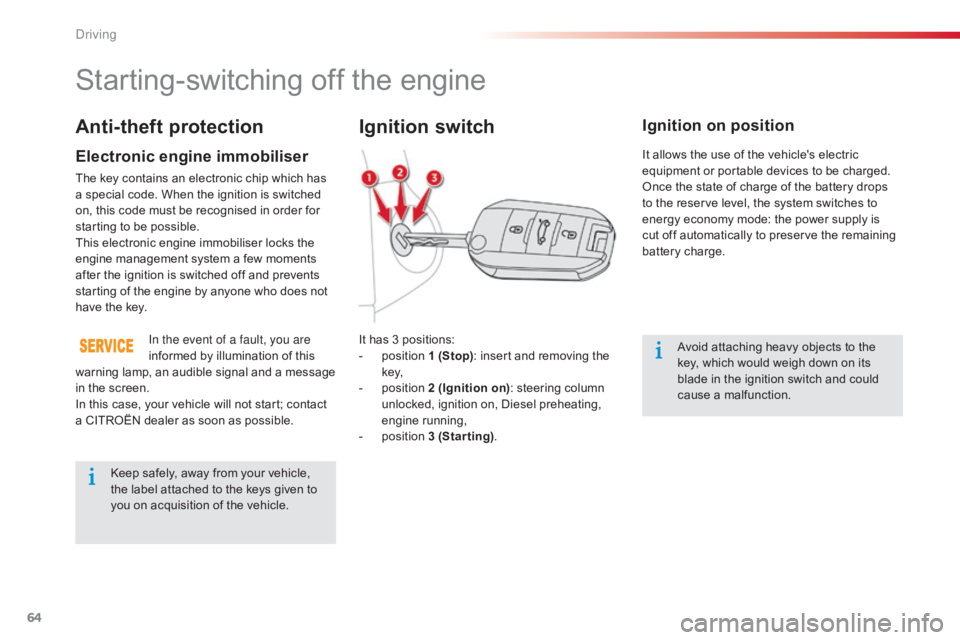
64
C-elysee_en_Chap05_conduite_ed01-2016
Starting-switching off the engine
It has 3 positions:
- p osition 1 (Stop):
insert and removing the
k
ey,
-
p
osition 2 (Ignition on) :
steering column
u
nlocked, ignition on, Diesel preheating,
e
ngine
r
unning,
-
p
osition 3 (Star ting).
Ignition switch
It allows the use of the vehicle's electric e
quipment or portable devices to be charged.
Once
the state of charge of the battery drops
t
o the reserve level, the system switches to
e
nergy economy mode: the power supply is
c
ut off automatically to preserve the remaining
b
attery charge.
Ignition on positionAnti-theft protection
Electronic engine immobiliser
The key contains an electronic chip which has a special code. When the ignition is switched
o
n, this code must be recognised in order for
s
tarting to be possible.
This
electronic engine immobiliser locks the
e
ngine management system a few moments
a
fter the ignition is switched off and prevents
s
tarting of the engine by anyone who does not
h
ave the key.In the event of a fault, you are
informed
by illumination of this
w
arning lamp, an audible signal and a message
i
n the screen.
In
this case, your vehicle will not start; contact
a
CITROËN dealer as soon as possible.
Keep
safely, away from your vehicle,
t
he label attached to the keys given to
y
ou on acquisition of the vehicle. Avoid
attaching heavy objects to the
k
ey, which would weigh down on its
b
lade in the ignition switch and could
c
ause a malfunction.
Driving
Page 74 of 260

72
C-elysee_en_Chap05_conduite_ed01-2016
AUTO and - appear in the instrument pan
el.
F
Sel
ect position N .
F
P
ress
the brake pedal.
F
W
ait
for around 30 seconds until N or a
gear
appears in the instrument panel.
F
M
ove
the gear selector to position A, then
to position N .
F
W
ith
your foot still on the brake pedal, start
t
he
eng
ine.
The
gearbox is operational again.
Reinitialisation
Following disconnection of the battery, it is necessary to reinitialise the gearbox.
F
S
witch on the ignition.
Before
doing
anything
under
the
b
onnet,
ensure
that
the
gear
selector
i
s in neutral (position N )
and
that
the
p
arking
brake
is
applied. In
exceptional circumstances, the
g
earbox may need an automatic
r
einitialisation: starting and gear
c
hanging are no longer possible.
AUTO
and - appear in the
instrument
pan
el.
For
all
parking
situations,
you
must
apply the parking brake
to
immobilise
t
he
vehicle.
When
immobilising
the
vehicle
with
the
e
ngine
running,
you
must
put
the
gear
s
elector into neutral (position N ).
Before
switching
off
the
engine:
-
c
hange
to
position
N to be in neutral,
or
-
l
eave
the
vehicle
in
gear;
in
this
case
the
v
ehicle
cannot
be
moved.
Follow
the procedure described above.
Stopping the vehicle
With the ignition o n, i f t his w arning l
amp comes on and AUTO
flashes,
accompanied by an audible signal and
a
message
in the multifunction screen, this
i
ndicates
a
gearbox fault.
Have
it
checked by a CITROËN dealer or a
q
ualified
w
orkshop.
Operating fault
Driving
Page 84 of 260

82
C-elysee_en_Chap05_conduite_ed01-2016
Stop & Start
Operation
Going into engine STOP mode
The "ECO" warning lamp comes o
n in the instrument panel and the
e
ngine goes into standby:
-
w
ith a 5-speed electronic gearbox , with
the vehicle stationary, when you press
the
brake pedal or put the gear selector in
p
osition N .
A
time
counter calculates the sum of the
p
eriods
in
STOP mode during a journey. It rests
i
tself
to
zero every time the ignition is switched
o
n
with
the key.
The
Stop
&
Start system
puts
the
engine
t
emporarily
into
standby
-
STOP
mode
-
during
s
tops
in
the
traffic
(red
lights,
traffic
jams,
or
o
ther...).
The
engine
restarts
automatically
-
S
TART
mode
-
as
soon
as
you
want
to
move
o
ff.
The
restart
takes
place
instantly,
quickly
a
nd
silently.
Per fect
for
urban
use,
the
Stop
&
Start
system
r
educes
fuel
consumption
and
exhaust
e
missions
as
well
as
the
noise
level
when
s
tationary. Never
refuel with the engine in
S
TOP mode; you must switch off the
i
gnition with the key.
For
your comfort, during parking
m
anoeuvres, STOP mode is not
a
vailable for a few seconds after
c
oming out of reverse gear.
STOP
mode does not affect the
f
unctionality of the vehicle, such as for
example,
braking, power steering...
Driving
Page 85 of 260

83
C-elysee_en_Chap05_conduite_ed01-2016
Going into engine START mode Special cases: START invoked automatically
The "ECO" warning lamp goes o
ff and the engine starts with an
e
lectronic gearbox :
-
g
ear
selector in position A or M, when you
release
the brake pedal,
-
o
r
gear selector in position N and the brake
p
edal
released, when you move the gear
s
elector to position A or M ,
-
o
r
when you engage reverse gear.For
reasons of safety and for your comfort, S
TART mode is invoked automatically when:
-
y
ou open the driver's door,
-
y
ou unfasten the driver's seat belt,
-
t
he speed of the vehicle exceeds 2 mph
(
3 km/h) with an electronic gearbox,
-
s
ome special conditions (battery charge,
e
ngine temperature, braking assistance,
a
mbient temperature...) where the engine is
n
eeded for control of a system.
The "ECO"
warning lamp flashes for
a
few seconds, then goes off.
This operation is per fectly normal.
Special cases: STOP mode not
available
STOP mode is not invoked when:
- t he driver's door is open,
-
t
he driver's seat belt is not fastened,
-
t
he engine is needed to maintain a
c
omfortable temperature in the passenger
c
ompartment,
-
d
emisting is active,
-
s
ome special conditions (battery charge,
e
ngine temperature, braking assistance,
a
mbient temperature...) where the engine is
n
eeded to assure control of a system.
The "ECO"
warning lamp flashes for
a
few seconds then goes off.
This operation is per fectly normal.
5
Driving
Page 86 of 260

84
C-elysee_en_Chap05_conduite_ed01-2016
In the event of a fault with the system, the indicator lamp in the "ECO OFF" button
flashes
for a few moments, then comes on
c
ontinuously.
Have
it checked by a CITROËN dealer or a
q
ualified
w
orkshop.
In
the event of a fault in STOP mode, the
v
ehicle may stall. All of the warning lamps
i
n the instrument panel come on. It is then
n
ecessary to switch off the ignition and start
t
he engine again using the key.
Operating fault
The Stop & Start system requires
a 12 V battery with a special
s
pecification
a
nd
t
echnology.
All
work on this type of battery must be
c
arried out only by a CITROËN dealer
o
r a qualified workshop.
For
more information on the 12 V
b
attery, refer to the corresponding
s
ection.
Press
this
button
to
deactivate
the
system.
Deactivation
is
confirmed
by
illumination
of
the
i
ndicator
lamp
in
the
button
and
the
display
of
a
message.
Pressing
this
button
again
reactivates
the
s
ystem.
The
indicator
lamp
in
the
button
goes
off,
a
ccompanied
by
the
display
of
a
message.
Deactivation / Manual
reactivation
In certain cases, such as the need to maintain a comfortable temperature in the passenger
c
ompartment, it may be useful to deactivate the
S
top & Start system.
The
system can be deactivated at any time,
o
nce the ignition is on.
If
the engine is in STOP mode, it then restarts.
The
Stop & Start system is reactivated
a
utomatically every time the ignition is
switched
on.
Opening the bonnet
Before
doing anything under the
b
onnet, deactivate the Stop & Start
s
ystem to avoid the risk of injury
r
elated to an automatic change to
S
TART mode.
Driving on flooded roads
Before
driving through a flooded road,
i
t is strongly recommended that you
d
eactivate the Stop & Start system.
For
more advice on driving, particularly
o
n flooded roads, refer to the
c
orresponding
s
ection.
Driving